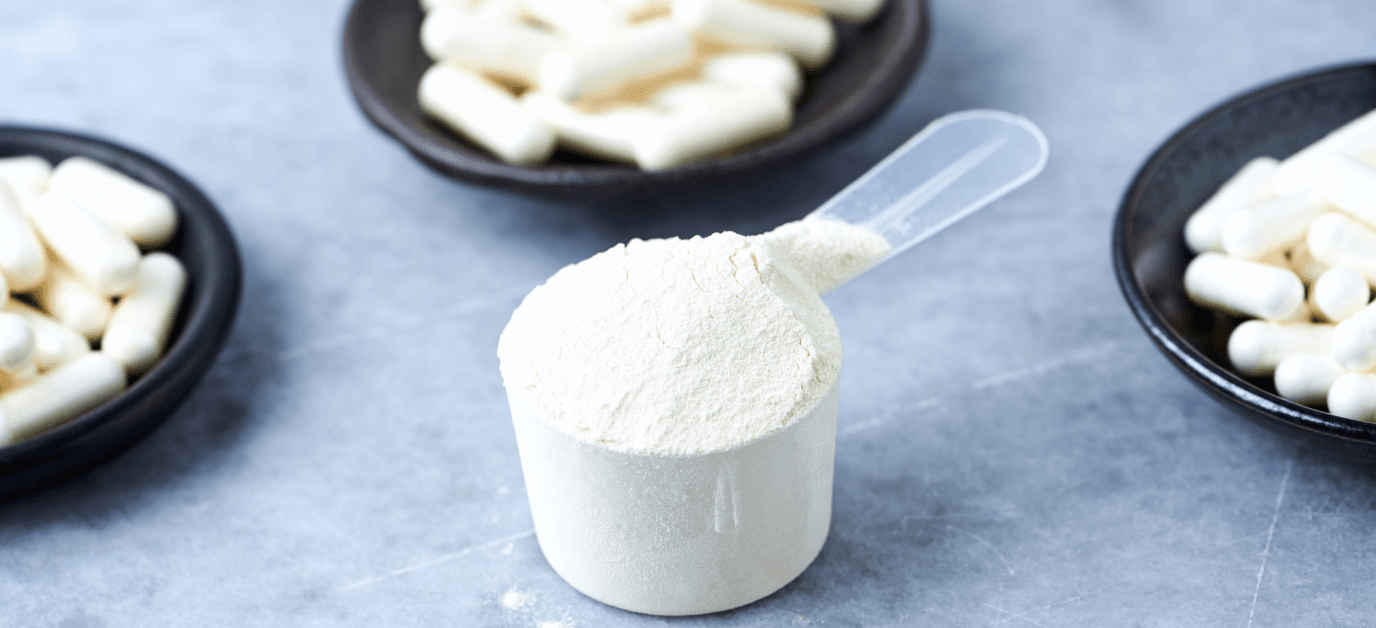

What is the role of glutamine?
28.05.2025Table of contents
What is L-glutamine?
L-glutamine is the most useful form of glutamine. It is one of the 20 amino acids and is found in large amounts in the body. Glutamine has many roles including immune function, the transportation of nitrogen, brain function, and digestion support. Glutamine also helps the creation of protein in the body.
As a nonessential amino acid, the body produces it's own glutamine. Glutamine is also available from food sources such as dairy products, nuts, meat and fish, and leafy green vegetables. That said, it is possible to have low levels of glutamine.
For example, injury, stress, and illness can lead to depleted glutamine levels. This is also the case if we exercise frequently and intensely. Supplementing glutamine up to 12g per day can be especially useful. However, you only need between 3-6g per day to meet the needs of your body.

What is the role of glutamine?
Immune function
L-glutamine has a role in immune function. The body uses glutamine to produce white blood cells – lymphocytes. Lymphocytes support our immune systems. This is because lymphocytes help to fight infections and keep us well.
Nitrogen transportation
Glutamine helps with the transportation of nitrogen around out body. This is especially useful, as nitrogen is an important component of protein. Glutamine also helps to remove waste products from the body, such as ammonia. Accumulation of ammonia can occur during exercise and can cause us to feel fatigued. So, glutamine helps us to sustain our energy levels during workouts.
Muscle Repair
In terms of muscle recovery, glutamine aids muscle repair. Because glutamine is a building block of protein, it plays a role in muscle growth. Glutamine also helps to stimulate the synthesis of glutathione. Glutathione is a potent antioxidant that helps protect our muscles from damage when under stress.

Brain function
L-glutamine plays a key role in the brain. It is a precursor of three neurotransmitter amino acids – glutamate, aspartate, and GABA. It is also a vital source of energy for our nervous systems. This is because, when our brains do not receive enough glucose, the body compensates by increasing glutamine metabolism for energy.
Digestive health
Finally, evidence suggests that glutamine can support healthy digestive function. This is because it helps to maintain a healthy mucus barrier in the gut. Disruption of the gut barrier is what often leads to gut symptoms, such as bloating.
In terms of digestive health, glutamine helps to repair the multi-layered gut wall and reduce new damage to this wall. It does so by enabling the cells in our guts (enterocytes) to regenerate more quickly. This helps the seal the junctions in our guts and keep the lining of our guts in an optimal healthy state.
In addition, glutamine helps to support the villi in our small intestines. The villi are hair-like projections that line our small intestines to improve the absorption of nutrients. Finally, glutamine is useful in keeping our bowel movements regular – therefore maintaining a healthy gastrointestinal tract (GI tract) or digestive system.

Dosing glutamine
L-glutamine is typically available in tablet or powder form. On average, we get around 3-6g of glutamine through our dietary protein. However, this can be increased, and short-term evidence suggests no ill-effect of consuming 20-30g of glutamine or 0.65g/kg of body mass.
Research has shown that taking glutamine post workout can prevent the body from using muscles as energy. This is because, in low carbohydrate states (after exercise), our glutamine concentrations tend to be lower. That said, work suggests that it may also be useful to take glutamine before a workout, due to its role in glucose energy control.
Because of this, when you supplement glutamine is really your choice. But 2-6g post workout and within 20 minutes of exercise can help to boost recovery and muscle repair.
Research looking at doses of glutamine range from 5-28g per day. However, an observed safe amount of glutamine is around 14g per day. It is nonetheless suggested that if you experience nausea, bloating, heartburn or stomach upset, you may be taking too much glutamine. It is important to raise any concerns of with a doctor before supplementing glutamine.
Take home message
Glutamine is a nonessential amino acid that has several vital roles in the body. Potential benefits include, immune function, the transportation of nitrogen, brain function, digestion support, and muscle repair. Although we create our glutamine, supplementation may be especially useful for athletes, or when we are ill, injured, under stress.
References:
https://www.ncbi.nlm.nih.gov/pmc/articles/PMC6266414/
https://www.ncbi.nlm.nih.gov/pmc/articles/PMC4369670/
https://www.sciencedirect.com/topics/biochemistry-genetics-and-molecular-biology/glutamine
https://www.acs.org/molecule-of-the-week/archive/g/l-glutamine.html
https://www.verywellhealth.com/leaky-gut-syndromeintestinal-permeability-89258
https://www.nhs.uk/conditions/bloating/
https://www.livestrong.com/article/249890-list-of-foods-that-contain-glutamine/
https://medlineplus.gov/ency/article/002222.htm
https://www.sciencedirect.com/science/article/abs/pii/S0899900715000350?via%3Dihub
https://www.ncbi.nlm.nih.gov/pmc/articles/PMC7285218/
https://www.verywellhealth.com/magnesium-for-constipation-and-ibsc-1944780
https://www.nhs.uk/conditions/probiotics/
https://academic.oup.com/jn/article/138/10/2045S/4670120?login=false
https://www.sciencedirect.com/science/article/pii/S0022316622146031
https://www.verywellfit.com/l-glutamine-89469
https://pmc.ncbi.nlm.nih.gov/articles/PMC10175630/
https://www.sciencedirect.com/science/article/pii/S0022316622096973
https://pmc.ncbi.nlm.nih.gov/articles/PMC6520936/


